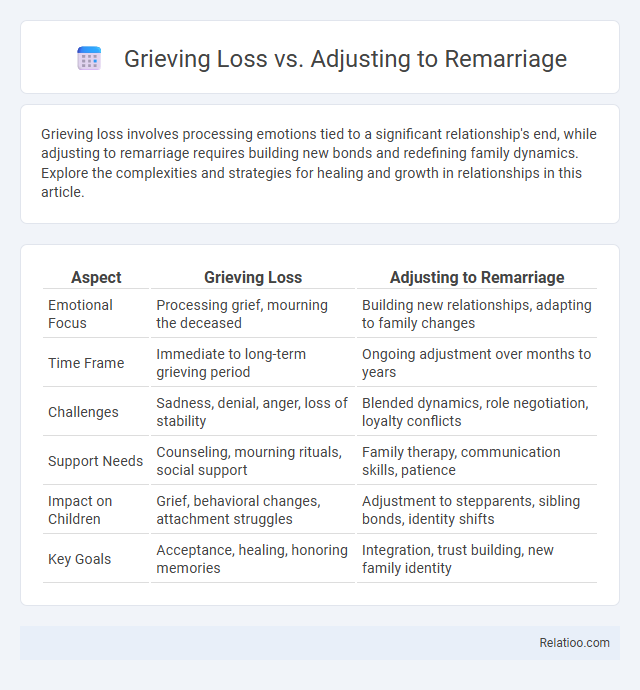Grieving loss involves processing emotions tied to a significant relationship's end, while adjusting to remarriage requires building new bonds and redefining family dynamics. Explore the complexities and strategies for healing and growth in relationships in this article.
Table of Comparison
| Aspect | Grieving Loss | Adjusting to Remarriage |
|---|---|---|
| Emotional Focus | Processing grief, mourning the deceased | Building new relationships, adapting to family changes |
| Time Frame | Immediate to long-term grieving period | Ongoing adjustment over months to years |
| Challenges | Sadness, denial, anger, loss of stability | Blended dynamics, role negotiation, loyalty conflicts |
| Support Needs | Counseling, mourning rituals, social support | Family therapy, communication skills, patience |
| Impact on Children | Grief, behavioral changes, attachment struggles | Adjustment to stepparents, sibling bonds, identity shifts |
| Key Goals | Acceptance, healing, honoring memories | Integration, trust building, new family identity |
Understanding Grief After Loss
Understanding grief after loss involves recognizing the complex emotional responses triggered by death or separation, including sadness, anger, and confusion. Grieving loss requires time and support to process these feelings, which differ significantly from adjusting to remarriage, where individuals navigate blending families, trust-building, and new roles. The process emphasizes emotional healing and acceptance before moving forward in new relationships to ensure healthy psychological adaptation.
The Emotional Stages of Bereavement
The emotional stages of bereavement encompass denial, anger, bargaining, depression, and acceptance, each uniquely experienced during grieving loss, adjusting to remarriage, or facing additional losses. Grieving loss often triggers intense feelings of sorrow and despair, while adjusting to remarriage introduces complex emotions such as guilt, loyalty conflicts, and hope for new beginnings. Navigating these stages requires acknowledging the evolving nature of grief and emotional resilience to foster healing and adaptation amid significant life transitions.
The Decision to Remarry: Emotional Readiness
Emotional readiness plays a crucial role in the decision to remarry after experiencing loss, as unresolved grief can complicate forming new intimate bonds. Research indicates that individuals who have processed their grief effectively demonstrate higher relationship satisfaction and stability in subsequent marriages. Prioritizing emotional healing before remarriage fosters healthier adjustment and reduces potential conflicts arising from residual mourning.
Common Challenges in Adjusting to Remarriage
Common challenges in adjusting to remarriage include navigating complex emotions such as loyalty conflicts, blending family dynamics, and redefining personal identity after loss. Individuals often struggle with feelings of guilt over moving on, managing relationships with former partners or deceased spouses, and establishing trust within a new family structure. These challenges require emotional resilience and communication strategies to foster healthy bonds and acceptance in the remarried family unit.
Navigating Conflicting Emotions: Guilt and Hope
Experiencing the grieving loss of a loved one often triggers intense feelings of guilt, especially when adjusting to remarriage, as conflicting emotions of loyalty and hope arise. Your emotional journey involves balancing the sorrow of loss with the promise of new beginnings, where acknowledging both your grief and your hope fosters healthier healing. Navigating these complex feelings requires compassionate self-awareness and patience to embrace your evolving story without shame.
Impact on Children: Blending Families After Loss
Grieving the loss of a parent and adjusting to remarriage each uniquely impact children's emotional well-being and sense of security. Your approach to blending families after loss should prioritize open communication, validating children's feelings while establishing new family routines. Understanding the distinctions between mourning a loss and navigating changes in family dynamics helps support children through this challenging transition.
Honoring the Past While Embracing the Future
Grieving loss involves acknowledging deep emotions tied to a significant absence, while adjusting to remarriage includes navigating new relationships and blending family dynamics. Honoring the past requires preserving memories and respecting the emotional impact of previous bonds, fostering healing without diminishing their significance. Embracing the future means balancing remembrance with open-mindedness to new connections, supporting growth and resilience within evolving family structures.
Building Communication in a New Marriage
Building communication in a new marriage after grieving loss or adjusting to remarriage requires empathy and patience to honor past experiences while fostering trust. You can strengthen your relationship by openly discussing feelings related to previous losses and setting clear expectations for your shared future. Effective communication helps navigate emotional complexities and promotes a foundation of understanding and support.
Coping Strategies: Support Systems and Therapy
Effective coping strategies for grieving loss and adjusting to remarriage involve building strong support systems, including friends, family, and support groups that provide emotional comfort and shared experiences. Therapy, such as cognitive-behavioral therapy (CBT) or grief counseling, offers structured guidance to process emotions, address identity changes, and develop resilience during transitions. Utilizing both social support networks and professional counseling enhances emotional healing and facilitates healthier adjustment to significant life changes.
Creating a Healthy Foundation for Moving Forward
Grieving loss involves acknowledging your emotions and allowing yourself to process the pain of losing someone important, which is crucial before moving on. Adjusting to remarriage requires building trust, open communication, and blending lives while respecting past experiences. Creating a healthy foundation for moving forward means balancing emotional healing with new commitments, ensuring your well-being and relationship growth are prioritized.

Infographic: Grieving Loss vs Adjusting to Remarriage
 relatioo.com
relatioo.com